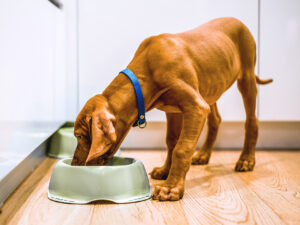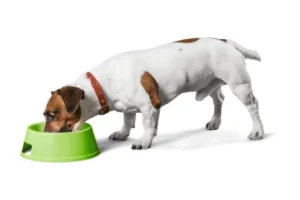Have you ever wondered how long does it take for dogs to digest food? However, the exact time it takes for a dog to digest their food can vary depending on several factors, including the type and size of the dog, the kind of food they are eating, and its digestive system. In this article, we’ll explore the factors that can affect a dog’s digestion time and offer tips for ensuring that your dog is getting the nutrition they need.
The length of time it takes for a dog to digest food can vary depending on many factors, including the size and breed of the dog, the type of food being eaten, and the individual dog’s metabolism. It can take 8-10 hours for a dog to digest a meal.
However, some larger breeds may take longer to digest their food, while smaller species may be able to digest their food more quickly. The type of food being eaten can also affect digestion time. For example, dry kibble may take longer to digest than wet or raw food. Remember that every dog is different, and the time it takes to digest food can vary from one individual to the next.
How long does it take for dogs to digest food?

Generally, it takes about 8 to 12 hours for a dog to digest its food and eliminate waste. However, this can vary significantly depending on the individual dog and the specific circumstances.
Smaller dogs tend to have faster digestion times than larger dogs, and some breeds may have shorter or slower digestion times than others. The type and amount of food being eaten can also affect digestion time. For example, a dog that consumes a large meal high in fiber may take longer to digest it than a dog that eats a smaller meal with less fiber.
Pay attention to your dog’s digestion patterns and be aware of any changes that may indicate a potential health issue.
What factors affect how long it takes for a dog to digest food?
Several factors can affect how long it takes for a dog to digest food, including:
Type and size of the dog: Smaller dogs have faster metabolism rates than larger dogs, so that they may digest their food more quickly.
Type of food: Different types of dog food can be digested at different rates. For example, dry kibble is typically more easily digested than wet or canned food, which can take longer to digest.
Nutrient content of the food: Foods that are high in protein and fat may take longer to digest than those that are lower in these nutrients.
Amount of food: Eating a large quantity of food at once can slow down digestion, as the stomach and intestines need to work harder to process the larger volume of food.
Individual digestive system: Just like humans, some dogs may have faster or slower digestion times due to individual differences in their digestive systems.
Water intake: Drinking plenty of water can help to keep the digestive system functioning correctly and may help to speed up digestion time.
Exercise: Regular exercise helps keep the digestive system functioning correctly and may help to speed up digestion time.
How long does it take for a dog to digest dry kibble?

It typically takes dogs 6 to 8 hours to digest dry kibble. The exact amount of time it takes for a dog to digest its food will depend on a variety of factors, including the size and breed of the dog, the specific type of kibble they are eating, and the overall health of the dog.
Some dogs may be able to digest kibble more quickly, while others may take longer. It’s a good idea to feed your dog small meals throughout the day rather than one large meal to help them digest their food more efficiently.
Also, ensure your dog has access to plenty of fresh water to help them stay hydrated and aid digestion.
How long does it take for a dog to digest wet food?
It typically takes dogs about 6 to 12 hours to digest wet food, but this can vary depending on many factors, such as the size and breed of the dog, the type of wet food, and the individual dog’s digestive system.
Wet food is generally more accessible for dogs to digest than dry food because it contains more water, which helps to break down the nutrients in the food and move them through the digestive tract more quickly.
However, it’s important to remember that every dog is different, and the time it takes to digest wet food can vary from one dog to the next.
How long does it take for a dog to digest raw food?
Dogs can digest raw food more quickly than they can digest cooked food. This is because cooking food can denature some proteins and make them more challenging to digest.
That being said, the digestion process in dogs is generally quite fast, and it is common for a dog to digest a meal within 8-12 hours fully. Some dogs may be able to digest their food even more quickly, while others may take a bit longer.
It is also worth noting that the digestion process can be affected by other factors, such as any underlying health conditions or the amount of exercise the dog gets.
How long does it take for a dog to digest cooked meat?

It takes about 8 to 10 hours for a dog to digest cooked meat. However, the amount of time it takes for a dog to digest food can vary depending on factors and the individual dog’s digestive system. Some dogs may digest food more quickly or slowly than others.
Also, remember that the amount of time it takes for a dog to digest food can be affected by other factors, such as the dog’s activity level, stress levels, and overall health.
It’s generally recommended to feed your dog small, frequent meals rather than one large meal to help support their digestive system and prevent gastrointestinal issues. It’s also essential to ensure that your dog has access to plenty of fresh water to help them stay hydrated and support proper digestion.
How long does it take for a dog to digest vegetables and fruits?
Dogs can quickly digest vegetables and fruits for 5 to 10 hours. However, some dogs may take longer to digest these foods, especially if they are not used to consuming them or have underlying digestive issues.
It is important to note that dogs have a shorter digestive tract than humans, which means they can digest and absorb nutrients from their food more efficiently.
However, it is still essential to monitor your dog’s dietary intake and ensure that they receive a balanced diet that meets its nutritional needs.
How can I tell if my dog is digesting their food properly?
There are a few signs that can indicate that your dog is digesting their food properly:
Regular bowel movements
If your dog is producing regular, firm stools that are not too hard or too soft, this is a good sign that they are digesting their food properly.
Healthy weight
If your dog is maintaining a healthy weight, it is also a sign that they are correctly digesting their food. If they are gaining or losing weight unexpectedly, this could be a sign of a digestion issue.
Good energy levels
If your dog has good energy levels and is active and alert, it could be a sign that it is digesting its food properly.
Normal appetite
If your dog has a normal appetite and is eating and drinking usually, this is a good sign that its digestion is working correctly.
Can a dog’s digestion be improved with certain supplements or diets?

There are a few things that can help improve a dog’s digestion, including:
Feeding high-quality, commercial dog food: Choosing high-quality dog food that is formulated to meet your dog’s nutritional needs can help support healthy digestion.
Adding fiber to the diet: Fiber can help bulk up the stool and make it easier for your dog to pass. Good sources of fiber for dogs include pumpkin, sweet potatoes, and green beans.
Probiotics: These supplements contain beneficial bacteria that can help support a healthy digestive system.
Enzymes: These supplements can help break down food in the digestive system, making it easier for your dog to digest and absorb nutrients.
Can a dog’s digestion be slowed down by certain factors?
Certain factors can slow down dog digestion. Some common causes of slowed digestion in dogs include:
Age
As dog’s age, their metabolism tends to slow down, which can lead to slower digestion.
Diet
Feeding your dog a diet low in fiber or containing too much fat can slow down digestion.
Medical conditions
Certain medical conditions, such as pancreatitis, inflammatory bowel disease (IBD), and hypothyroidism, can cause slowed digestion in dogs.
Medications
Some medications, such as pain and anti-inflammatory drugs, can slow digestion.
Stress
Stress can also impact a dog’s digestion, leading to slowed or disrupted digestion.
How do I know if my dog has a digestive problem?

There are several signs that your dog may have a digestive problem. These include:
Changes in appetite: If your dog is not eating as much as usual or is not interested in food, this could signify a digestive issue.
Vomiting: Vomiting can signify various digestive problems, such as gastritis, pancreatitis, or even a foreign object your dog has ingested.
Diarrhea: Diarrhea can be caused by several factors, including dietary changes, infections, or inflammatory bowel disease.
Constipation: If your dog is having difficulty passing stools or is producing small, hard chairs, this could be a sign of constipation.
Abdominal pain: If your dog displays signs of abdominal pain, such as crying or whining when touched in the abdominal area, this could be a sign of a digestive problem.
Weight loss: Unintentional weight loss can be a sign of a digestive problem, as it can be caused by a variety of factors, such as a lack of appetite, difficulty digesting food, or malabsorption of nutrients.
How do I treat digestive problems in dogs?
Treating digestive problems in dogs often involves a combination of dietary modifications, medications, and supplements. The specific treatment plan will depend on the underlying cause of the problem and the severity of the symptoms.
One of the first steps in treating digestive problems in dogs is to identify any dietary factors contributing to the issue. For example, if your dog has food allergies or sensitivities, your veterinarian may recommend switching to a hypoallergenic diet.
Alternatively, if your dog needs more fiber in their diet, your veterinarian may recommend adding sources of fiber, such as pumpkin, sweet potatoes, or green beans.
Medications can also be an effective treatment for digestive problems in dogs. Antacids can help neutralize excess stomach acid and reduce symptoms of heartburn and indigestion.
Anti-diarrheal medications can help reduce the frequency and severity of diarrhea. And medications to control vomiting can help reduce the frequency and severity of vomiting.
Probiotics and enzymes are other treatment options that can help support a healthy digestive system. Probiotics contain beneficial bacteria that can help balance the microflora in the digestive system. In contrast, enzymes can help break down food in the digestive system, making it easier for your dog to digest and absorb nutrients.
Can a dog’s digestion be affected by their age or breed?

Dog’s digestion can be affected by their age and breed. As dog’s age, their digestive system may become less efficient, which can lead to digestive issues such as constipation or diarrhea. This is especially common in older dogs, which may be less active and have a slower metabolism.
Certain breeds may also be more prone to digestive issues due to their specific anatomies or inherited health conditions. For example, some small breed dogs may be more inclined to pancreatitis due to their smaller size and higher fat-to-protein ratio in their diet.
Additionally, some large breed dogs may be more prone to gastrointestinal problems due to their size and the strain it can put on their digestive system.
How do I prevent digestive problems in my dog?
There are several steps you can take to help prevent digestive problems in your dog:
Feed a high-quality, commercial dog food: Choosing high-quality dog food that is formulated to meet your dog’s nutritional needs can help support healthy digestion. Look for a brand that uses high-quality ingredients and avoids fillers, artificial preservatives, and other additives that can harm your dog’s health.
Monitor your dog‘s diet: Be mindful of what you feed your dog, and avoid giving them foods that can be harmful or difficult to digest. This includes foods high in fat or containing toxic ingredients to dogs, such as chocolate or grapes.
Gradually introduce new foods: If you want to add fresh foods to your dog’s diet, it’s essential to introduce them gradually to give their digestive system time to adjust. This can help prevent digestive upset and allow you to monitor your dog’s reaction to the new food.
Keep your dog hydrated: Adequate hydration is vital for healthy digestion. Make sure your dog has access to clean, fresh water at all times, and consider adding a little bit of water to their food if they are prone to constipation.
Keep your dog at a healthy weight: Being overweight or obese can strain your dog’s digestive system and increase the risk of digestive problems. Maintaining a healthy weight through a balanced diet and regular exercise can help prevent digestive issues.
Practice good hygiene: Proper hygiene can help prevent the spread of digestive problems, especially if your dog is in a multi-dog household. Keep feeding and watering areas clean, and wash your hands before and after handling your dog’s food.
Conclusion
In conclusion on how long does it take for dogs to digest food: the length of time it takes for a dog to digest food can vary depending on many factors, including the size and breed of the dog, the type of food being consumed, and the individual dog’s digestive system.
It takes dogs anywhere from 8 to 12 hours to digest food. However, some dogs may take longer or shorter to fully digest their meals.
It is crucial to monitor your dog’s digestion and consult a veterinarian if you notice any changes or abnormalities in their digestion or bowel movements. Understanding the factors that affect your dog’s digestion can help ensure that your furry friend stays healthy and happy.


